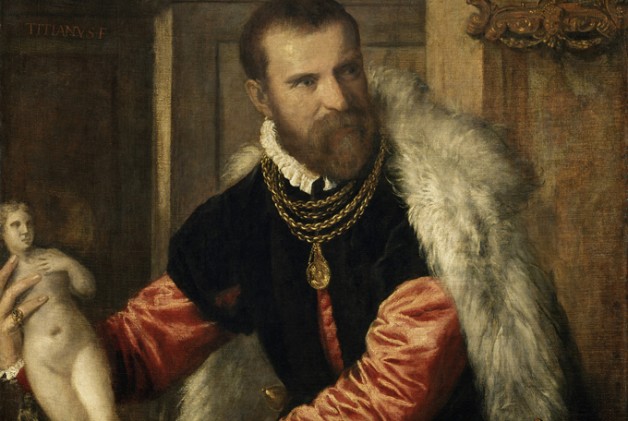Ho, every one who thirsts, come to the waters; and he who has no money, come, buy, and eat! Come, buy wine and milk without money and without price. Why do you spend your money for that which is not bread, and your labor for that which does not satisfy?
Isaiah 55:1-2
There’s a strange paradox in the message that the Lord speaks through the prophet Isaiah: how does one who has no money buy? Why does the Lord’s statement of infinite generosity still find expression in mercantile language? The answer lies in the mysterious truth that honest gift-giving and gift-receiving involve more than the exchange of physical goods; they involve the gift of self.
That might seem obvious. After all, ad campaigns always try to manipulate us into “expressing our love” with a certain doo-dad or knick-knack “for that special someone.” At some level everyone knows that when I give a gift, I say something about myself, I give something of myself, to the other person, and I hope – even expect – that his response will reveal something about him as well. A boy on a playground offering a toy car to another boy also opens himself in a humble, honest way – he wants to be friends. The boy who receives the car joyfully responds in kind – he reveals that he is grateful, that he loves cars too. They discover they have common ground, and perhaps become friends.
We intuitively understand the way that gift-giving involves who we are, not just how much money we have. That’s why we enshroud gift-giving with ritual and symbolism, from birthday parties to Christmas customs to Valentine’s Day missives.
But around Christmastime, we often start to forget the deeper dynamic of gift-giving and attend only to the superficial aspects of money invested, goods exchanged, and relationships awkwardly maintained for one more year. We can fall into a dreary Christmas moralism that reduces gift-giving to moral obligation or social nicety. Perhaps I don’t actually spend very much time with my cousin and am not very close to her. But she gave me a $15 travel toiletries set last year (which I’ve never used, and which sits collecting dust next to the other useless gifts I received last year and couldn’t re-gift), so now I feel obligated to give her a gift this year. So I head out to the nearest gee-gaw or flim-flam shop and buy her some innocuous something that costs $15, send it off with a pre-printed Christmas card that I hurriedly sign, and check “Cousin Cornelia” off my list of obligations for the year.
What’s wrong with this exchange? At one level, nothing. Maybe Cousin Cornelia’s useless toiletries are her way of saying “You’re my relative, and I don’t hate you,” which is about the same emotion I feel when her name comes up, so we exchange worthless trifles as a way of informing the other of our shared gladness that neither of us has yet shuffled off this mortal coil.
But all too often, the moralistic gift exchange does real harm to the giver and the receiver. Because we know that gift-giving should involve a shared receptivity of the giver to the receiver and vice versa, an obviously mercenary or impersonal gift can cut like a knife. The act of giving a gift inherently says “Here I am, come learn about me, I want to know about you, to spend time with you.” But when the specific mode of giving or the gift itself communicates only my own parsimony and my lack of interest in the other, I undermine the meaning of my gesture, and often enough I infuriate or wound him.
There can be no obligation in giving – no forced “free gift.” Love must be a free act of the will, and so must its expressions. If giving and receiving are genuine, they must be free, and open-ended.
This is why the Lord says through Isaiah that even the infinitely precious gift of redemption, of heavenly superabundance, must be bought, even if it is bought “without money and without price.” Jesus Christ bestows on us the Gift of God, the Holy Spirit, and in so doing reveals everything about the Father: that He is, that He loves us, that he desires us to be with him. We must respond freely, our souls elevated by grace; we can say in return, “Yes, I want you, I want this Gift, I want to know you and be with you.” This is the buying “without money and without price.” Or we can refuse, we can turn away from the gift to our own ways and means, we can continue to “spend [our] money for that which is not bread, and [our] labor for that which does not satisfy.”
Of course, even if I say yes to the gift that Jesus gives, I do not thereby automatically become perfectly charitable to all people. But in his life – from his humble birth to his triumphant cross and glorious resurrection – I can see the dynamic of true gift-giving lived out in flesh. I may never have enough real love for Cousin Cornelia on this earth to tell her anything more profound than “You’re my relative, and I don’t hate you.” But by ordering all my loves to Jesus Christ, I can ask for him to change my heart, to open me to a love that has no limits. And by receiving his supernatural love, I may be more disposed to receive the simple, flawed, but real expressions of love from those around me, and to respond to them with a generous heart.
“Ho, every one who thirsts, come to the waters; and he who has no money, come, buy, and eat!” By his grace, may this cry sound in our hearts as well.
Image: Titian, Jacopo Strada







